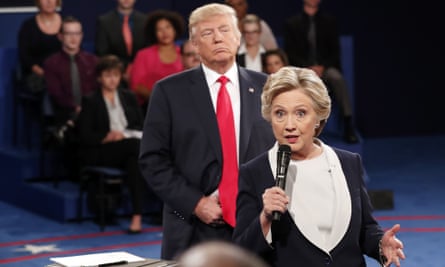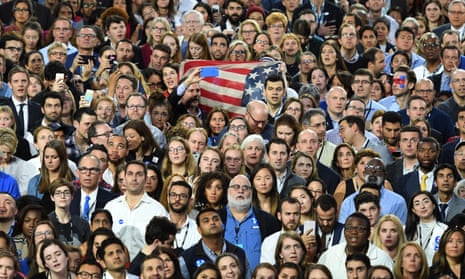Ever since their shock defeat in November 2016, Democrats have sought comfort in the age-old proverb that “our kids are our future”. After all, Hillary Clinton decisively won the youth vote, with 55% of millennials voting for her, while Donald Trump could not muster more than one-third. So does that mean the future is looking rosy?
In the past few months, the liberal media has seen hope in America’s youth. A AP-Norc/MTV Youth Political Pulse poll found that only a minority (33%) of young Americans approve of the way Trump is handling his job of president, while the majority believe that the president is “mentally unfit” (60%), “generally dishonest” (62%) or “a racist” (63%). In line of these findings, Vox triumphantly headlined: “The kids are not all right with Donald Trump.”
Similarly, a Pew Research Center study of the “generational gap in American politics” was met with hopeful coverage. It found, among other things, that millennials have by far the most negative views of Trump, having tumbled from a 64% job approval rating for President Obama in 2009-2010 to a dismal 27% approval of Trump in 2017-2018. It also found that millennials self-identify much less as conservative and much more as liberal than previous generations, supporting progressive stances on economic inequality, global warming, immigration and racial equality.
So it may take liberals by surprise to hear that a recent Reuters/Ipsos mega poll of 16,000 respondents, found that the Democrats are losing ground with millennials. While millennials still prefer the Democratic party over the Republicans, that support is tanking. In just two years, it dropped sharply from 55% to 46%. Meanwhile, their support for Republicans has remained roughly stable in the past two years, falling from 28% to 27%.

The trend is not universal among millennials, however. Reflecting developments within the broader population, there are strong gender and racial differences. The drop in Democratic support among white millennials is roughly the same (8%), but most of the defectors in that group seem to have moved to the Republicans (6%).
Today, as many white millennials support the Democrats as the Republicans (each 39%). Just two years ago, Democrats still had a 14% lead over Republicans among white millennials. The trends are even more pronounced among white male millennials. Today, this group favors the Republicans over the Democrats by a staggering 11%. In 2016, Democrats led white male millennials by 12%.
These polls mainly show that millennials are not so different from other Americans. They are also a very diverse group, divided by factors such as education, gender and race. They are less religious and more open than previous generations, which makes them mainly less supportive of the (current) Republican party. But their dislike of the Republicans should not be interpreted as a like of Democrats.
Millennials are at best soft Democrats. Many got enthused and mobilized by Barack Obama in 2008 and largely hung around for Obama in 2012 and, even less, Clinton in 2016. But many seem to have had enough. And who could blame them? Clinton’s campaign mainly targeted the illusive “moderate Republican”, the white, middle-aged middle class. And since her shock defeat, many prominent Democrats have pivoted towards the cliched “Trump voter” as defined by the liberal media, ie a middle-aged to older white, working-class male.
As far as the Democrats are relevant to the US political debate these days, they have largely focused on relatively “fringe” issues that many millennials don’t care much about. For example, millennials seem much less concerned about Russian meddling in US elections than the rest of the Democratic party elite. Even the newest golden issue, gun control, seems much more a post-millennial than millennial issue. A recent poll found that millennials are no more liberal on gun control than previous generations.
Just as the Republicans have blended their socio-economic and socio-cultural agendas, linking economic anxiety and cultural backlash, Democrats should link key concerns of millennials, especially economic inequality and cultural openness. This does not mean more, mostly symbolic “identity politics”, but integrating identity into a broader agenda of economic, environmental and social justice – staples of true progressive politics.
This is perfectly in sync with the priorities of millennials, irrespective of race, who support governmental protection of the environment and for whom key economic priorities are increasing job opportunities, increasing wages and decreasing economic inequality. The way to stop support for Democrats among millennials from sinking further is to speak to those needs in a meaningful way. The longer they fail to do that, the more lethal it becomes.
- Cas Mudde is a Guardian US columnist

